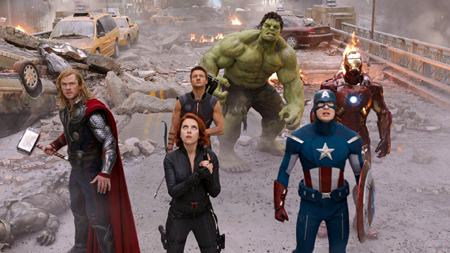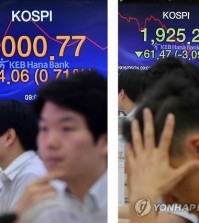- California Assembly OKs highest minimum wage in nation
- S. Korea unveils first graphic cigarette warnings
- US joins with South Korea, Japan in bid to deter North Korea
- LPGA golfer Chun In-gee finally back in action
- S. Korea won’t be top seed in final World Cup qualification round
- US men’s soccer misses 2nd straight Olympics
- US back on track in qualifying with 4-0 win over Guatemala
- High-intensity workout injuries spawn cottage industry
- CDC expands range of Zika mosquitoes into parts of Northeast
- Who knew? ‘The Walking Dead’ is helping families connect
Unseen cost of Avengers sequel

Seoul City will restrict traffic in several locations such as Gangnam Subway Station intersection and Mapo Bridge from March 30 to April 14 for the filming of the Avengers sequel. (Korea Times file)

Korean actress Soo Hyun, who will play a role in “Avengers: Age of Ultron,” arrives at a news conference announcing the deal between the Seoul Metropolitan Government and Marvel Studios for filming part of the movie in the capital earlier this month. The movie will be released sometime next year.
(Korea Times)
By Kim Young-jin
The announcement last week that Marvel Studios would film parts of its upcoming “The Avengers: Age of Ultra” in Seoul generated plenty of excitement in the capital. But government officials, more than film buffs, were in a celebratory mood.
The landing of the Avengers sequel is seen as a major win for the government, with officials calling it a “tent-pole” that will hold up the local industry by infusing millions of dollars and a slew of jobs.
But its arrival may have an unintended effect, one that could inconvenience smaller productions.
The reason lies in the government funding the film is slated to receive.
The support comes in the form of a “location incentive” offered by the government-backed Korean Film Council (KOFIC), which offers foreign productions up to a 30-percent cash rebate on money spent here.
By awarding the rebate to Avengers, KOFIC maxed out its annual 1 billion won ($930,000) budget for the program.
Due to the projected costs, the organization also moved to secure an additional, undisclosed amount of money from the Ministry of Culture, Sport and Tourism to include in the rebate. KOFIC operates under the ministry.
“America’s Top Model,” which will also shoot here, is slated to receive 700 million won, an amount rolled over from last year’s surplus.
Han Sang-hee, who manages KOFIC’s international co-production team, said there are several film and television projects applying for a rebate. Whether they will get one is up in the air.
“If our budget is used only for one project, then others looking to get the rebate won’t have a chance to shoot in Korea,” Han acknowledged. “But by supporting a big blockbuster such as the Avengers, we can have many economic effects.”
Following the Avengers deal, KOFIC has been negotiating with the Culture Ministry to secure additional funding. While Han expected money to be made available, he said it would likely “not (be) 100 percent of the amount we need.
“My worry is that however hard we try, we will get a very limited budget in the end,” meaning some films could get the rebate but others not.
The program, launched in 2011, operates on a first-come, first-served basis, which Han said is a bid to “respect every production’s own schedule.”
It is designed as a cash-incentive, rather than a tax-rebate program, the latter of which is more common and easier to manage. The tax-rebate system was impossible at the time, Han said, because it would have required changes to tax laws.
Industry insiders say incentives factor heavily into where projects end up being shot.
In the United States, there is even competition among states. New Mexico’s rebate program, for example, was reportedly an important factor in the decision to film popular American drama “Breaking Bad” there.
There are benefits for destination countries as well. Films such as “Lost in Translation” and “The Last Samurai” are credited with renewing interest in Japan and updating perceptions about the country.
Korean officials were told Avengers would portray Korea as a smart, IT-savvy country, a characterization the government hopes will be a boon for the tourism industry.
The question now is whether other productions can create that “win-win” situation in Korea.
Benson Lee, a Korean-American film director, said incentives are crucial to filmmakers because they make a project more viable to potential investors.
He hopes Korea will take advantage of its rising reputation as a hip country, a development sparked by the success of K-pop stars including Psy.
“Korea is entering the mainstream, especially among young people,” he said. “I hope the Ministry of Culture will realize it’s a pivotal year” and consider increasing the budget.
Lee, who directed last year’s Sony Pictures film “Battle of the Year,” is in Seoul preparing to shoot an independent drama, “Seoul Searching.”
The film focuses on a group of Korean teenagers from around the globe, who are sent to Korea in 1986 to learn about their roots. Lee says the English-language film will be a “sexy teen comedy” but will also give “deep insight” into Korean culture.
He said it is natural for all films to seek out the best incentives; and for a country to provide rebates to big-budget films.
“But at the same time, even small guys like me can make a wave in the independent world. And I think I can bring something to Korea as well ― a much deeper cultural insight that the world needs to understand about the country beyond just the K-pop culture it’s known for.”
















